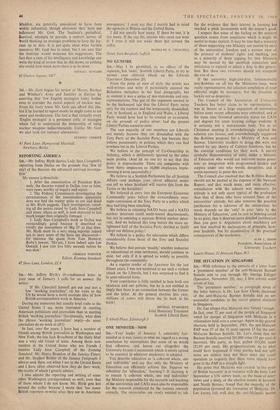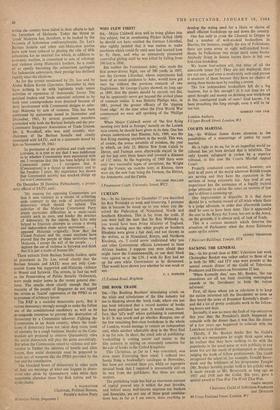THE SITUATION IN SINGAPORE SIR,—With reference to the extracts of
a letter from a 'prominent member' of the anti-Malaysia Barisan Sosialis sent to you through Mr. George Edinger (Spectator, November 29), may I first correct sonic errors of fact.
The 'prominent member,' as paragraph seven of the letter betrays, is Dr. Lee Siew Chow, chairman of the anti-Malaysia Barisan Sosialis and an un- successful candidate in the recent general elections in Singapore.
Dr. Lee alleges that Malaysia was 'forped firough.' In fact, over 72 per cent of the people of Singapore voted for merger of Singapore with Malaysia in a referendum held over a year ago. Again in the general elections held in September, 1963, the pro-Malaysia PAP won 37 of the 51 seats against 13 for the anti- Malaysia Barisan Sosialis. Dr. Lee's claim that the Barisan Sosialis received 201,000 votes (35 per cent) is incorrect. His party, in fact, polled 193,301 votes (32.95 per cent). His prognostications as to what could have happened if rival parties had not split votes are neither here nor there since one could speculate as cogently that these votes should have gone to the PAP in a straight fight.
His point that Malaysia was created 'at "the point of British bayonets' is at variance with the facts. Last September a UN survey team, on the basis of inter- views and a study of the election results in Sarawak and North Borneo, found that the majority of the population favoured the formation of Malaysia. Dr. Lee knows full well that the anti-Malaysia parties
within the country have failed in their efforts to halt the formation of Malaysia. Today the threat to 'crush' Malaysia has, therefore, to be backed by the bayonets of Indonesian confrontationists. Dr. Lee's Barisan Sosialis and other anti-Malaysian parties have now been reduced to playing the role of fifth columnists for an external foe which, in addition to economic warfare, is committed to acts of sabotage and violence along Malaysia's borders. As a result of so openly becoming the subservient apologists for Indonesian subversion, their prestige has declined rapidly since the elections.
As for the arrests mentioned by Dr. Lee and by
Abdul Rahim Karim (Spectator, December 6), they have nothing to do with legitimate trade union activities or repression of 'democratic' forces. The political leaders and 'trade unionists' referred to by both your correspondents were detained because of their involvement with Communist designs to sabo- tage Malaysia by acts of violence. This has been confirmed by statements issued in November and December, 1963, by several prominent members connected with both the Barisan Sosialis and the pro- Communist Singapore Association of Trade Unions. Mr. S. Woodhull, who was, until recently, vice- chairman of the Barisan Sosialis and closely associated with SATU, said in a statement issued by him on November 29, 1963 :
'In pursuance of my political and trade union activities, it is true to say that I was indifferent as to whether Communists were associated with me. I recognise that this has been helpful to the Communist cause . . . I recognise that it [Communism] is a threat to democracy and to the freedom I prize. My experience has shown that Communist activity has mucked things up for non-Communists.'
On December 20 Dominic Puthucheary, a promi- nent official of SATU, said :
'My reasons for opposing Communism are
that it uses violence as a means of achieving ends contrary to the ends of parliamentary democracy which should be upheld. The activities of the Malayan Communist Party create particular difficulties in a multi-racial society such as ours, and hinder the practice of democracy. In the unions, they have only helped to frustrate attempts to create a strong and independent trade union movement. . . . I opposed Malaysia originally. Now that the United Nations and the recent elections have proved that the people of these territories want Malaysia, I accept the will of the people. . . . I deplore the use of violence in Sarawak and think that it is just a waste of human life.'
These extracts from Barisan Sosialis leaders, quite as prominent as Dr. Lee, reveal clearly that the Barisan Sosialis and SATU were not only Com- munist fronts but supported anti-Malaysia violence in Brunei and Sarawak. The arrests, in fact (as well as the Preservation of Public Security Ordinance), were made major issues in the recent general elec- tions. The results show clearly enough that the majority of the people of Singapore do not regard the arrests as 'fascist' oppression or the PPSO as an instrument of arbitrary terror, The PAP is a socialist democratic party, But it values democracy strongly enough to make the fullest use of the constitutional machinery as well as its propaganda resources to prevent the destruction of democracy by a Communist takeover. Fighting the Communists in an Asian country, where the tradi- tions of democracy have not taken deep roots, must of necessity be a tough business. Insofar as the Com- munists are prepared to observe Queensberry rules the social democrats will play the game accordingly. But when the Communists resort to violence and sub- version to further the interests of hostile and alien forces, then social democrats must be prepared to make use of weapons like the PPSO provided by the law and the constitution.
The bleached bones of democracy in other parts of Asia are warnings of what can happen to demo- crats who abide by Queensberry rules while their opponents abandon them for flick knives and bi- cycle chains.
S. RAJARATNAM Chairman, Political Bureau, People's Action Party Waterloo Street, Singapore 1



































 Previous page
Previous page